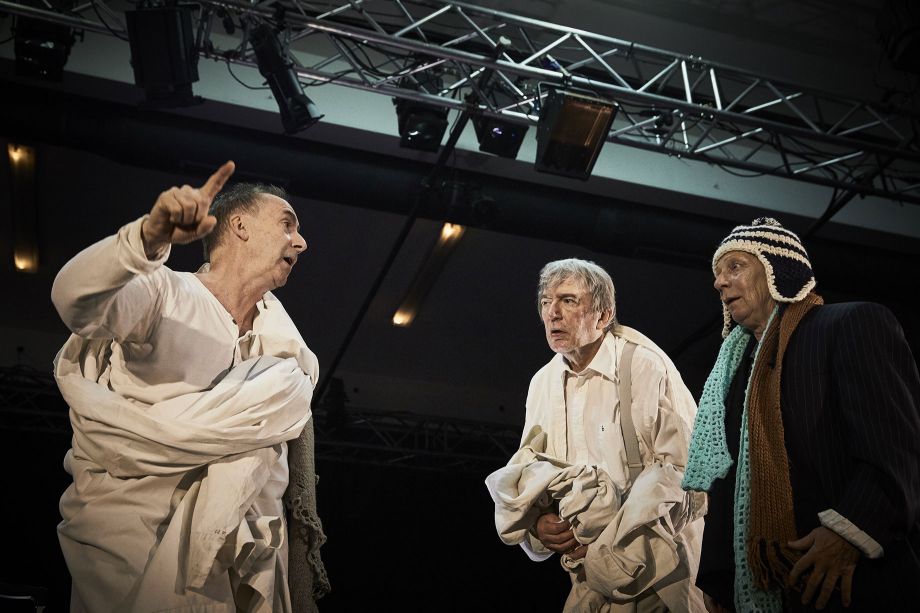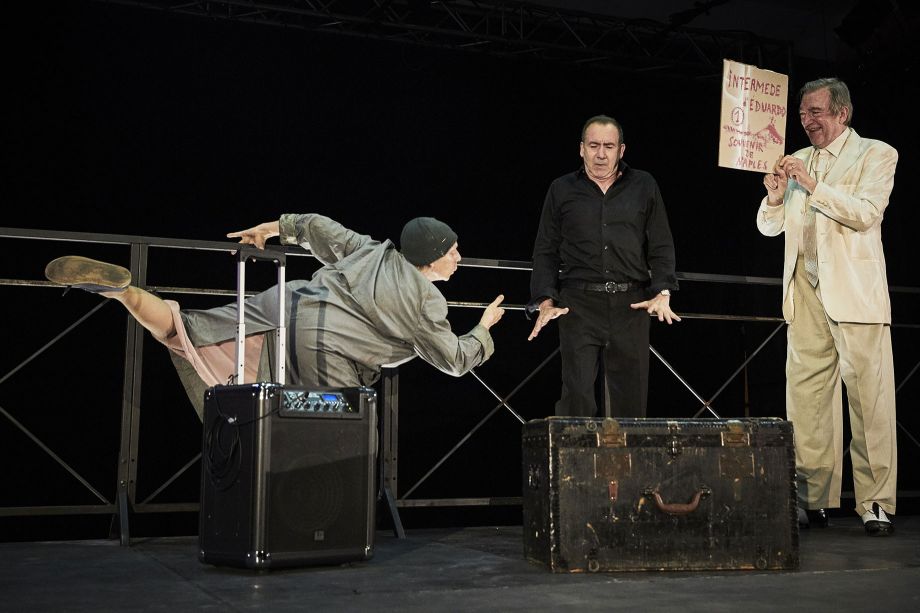Avignon 2019: Irène Bonnaud’s Amitié and the Lessons in Juicy Comedy, Delicious Acting and Humanity of Being

Let me tell you a secret – I love the old good comedy, its extensive gestures, inappropriate jokes, actors playing off each other, a quick change of a costume, a bit of dancing and singing; all that routine that seems to be fading away from the professional stages across the world, giving its place to serious, self-conscious, experimental and politically aware theatre. Please, do not get me wrong – all that seriousness is very important in the world that is falling apart due to its wars, economic crushes and changes in the environment. But comedy – people coming together to laugh and cry at their own follies – is vital too.
François Chattot, Jacques Mazeran, and Martine Schambacher – the players of Irène Bonnaud’s AMITIÉ – know their craft only too well. On the makeshift stage of this traveling performance, they play with objects and props that come out of the old chest. An old-fashioned telephone, a small broomstick and a scoop, and a large case with bills and notes all acquire the life of their own in this story about human attachments and lost hopes, told by three comedians brought on stage by the genius of Pier Paolo Pasolini and Eduardo De Filippo. In fact, the play itself is an homage to amitié or friendship that these two artists shared.
Loosely based on the unfinished screenplay Porno Theo Kolossal (Theological Porno Blockbuster), written by Pasolini shortly before his death, Irène Bonnaud’s AMITIÉ tells a pilgrimage story of Eduardo – the character to be based on Eduardo De Filippo himself – journeying through Europe of the mid 20th century.

Originally, Pasolini imagined De Filippo writing the dialogues for and starring in the film himself. As the project remained unfinished, the director Irène Bonnaud decided to use this script and the fragments of De Filippo’s plays, such as The Happy Widow (1931), Christmas at the Cupiellos (1931), Locked-Up Pain (1964), and A Good Recipe (1931), to construct her own “philosophical road” performance and thus to tie the characters’ personal stories with the history of the world. “The show starts like a philosophical tale and morphs into a picaresque fable in episodes”, the director explains. “The screenplay tells the story of Eduardo, a Neapolitan wise man who is following the star to Bethlehem but to whom so much happens on the way there so, by the time he gets to the Promised Land, Christ is long dead”.
With a stylistic nod to Christmas’ pageants, AMITIÉ takes the audience on the road as well. The actors change costumes and characters, they move easily from one story to the next, and they change their on-stage behaviour as only the most professional and the most experienced comedians can, switching from pure comedy to direct narration, from clownish routine to tragic innuendos. Using rich and diverse devices of the artisanal tradition of theatre, they take its spectators through the array of emotions, making us laugh at and gasp in disbelief of how egoistical and selfish, but also sacrificial and giving the human nature can be. In the traditions of Italian comedies, not French, as Bonnaud insists, her production mixes genres and feelings. It gives space to the wide comic gestures and laughter, but also invites tears and philosophical thoughts.
The work of Martine Schambacher deserves a special mentioning: not only she stars in each episode of this short production, she really presents its artistic vertebrae. A truly polyvalent performer, she plays the shallowness and the depth of human experiences at the same time. Funny and awkward soprano in the opening sequence that features three operetta singers who seek professional employment, she becomes loving wife and devoted sister in the following parts.
Performed outdoors (at least during the night when I attended this performance), in the theatrical conditions that leave much to desire, including the absence of personal mikes – a feature that seems to have become a norm in this festival’s edition – AMITIÉ is really an anthem to the professional stamina and unconditional love to theatre that we associate with the work of Eduardo De Flilippo and as exhibited by the three performers of Irène Bonnaud’s exuberant production. Simply – Bravo!
AMITIÉ
Texts Eduardo De Filippo, Pier Paolo Pasolini
Translation Hervé Joubert-Laurencin, Davide Luglio, Emanuela Pace
Direction Irène Bonnaud
With François Chattot, Jacques Mazeran, Martine Schambacher
Costumes Nathalie Prats
Lights and general manager Daniel Lévy
Production Festival d’Avignon, in co-production Châteauvallon Scène nationale, Centre dramatique national Besançon Franche-Comté, Centre dramatique national de Tours Théâtre Olympia, EPIC Hérault Culture – Théâtre sortieOuest, CCAS les Activités sociales de l’énergie, Espace des arts Scène nationale Chalon-Sur-Saône; residency Lilas en scène, in partnership with France Bleu Vaucluse, and with special thanks to Alain Gravier
Avignon Festival, Different locations , July 5-23, 2019